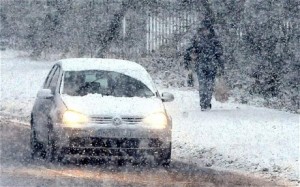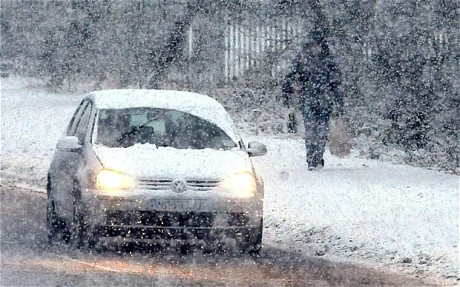With temperatures dropping and wintry weather setting in, we thought we would give you some useful advice for driving icy roads.
 Temperatures are forecast to drop to freezing overnight with forecasters saying there is a possibility of snow.
Temperatures are forecast to drop to freezing overnight with forecasters saying there is a possibility of snow.
Following the tips below can help make your journey safer.
Drive to suit the conditions
When roads are slippery it can take you up to 10 times longer to stop. Reduce your speed and drive with extra care, even if roads have been gritted.
Even after roads have been treated in winter, driving conditions may remain challenging, especially if the road location and layout mean there is a high risk of ice. Be aware that ice forms more easily on:
:: hilly or exposed roads
:: roads that pass under or over a bridge
:: roads shaded by trees or buildings
If you start to skid:
:: press the clutch
:: steer into the skid
:: as you straighten, steer back along the road
Emergency kit
You are advised to carry an emergency kit in your vehicle. A basic kit should include:
:: map
:: jump leads for the car battery
:: torch
:: warning triangle
:: ice scraper and de-icer
:: first-aid kit
:: warm clothes
If you’re planning a long trip or if severe weather is forecast, you may want to also have in your car:
:: a shovel (if there’s a chance of snow)
:: a pair of boots
:: a blanket
:: any medication you need to take regularly
:: food and a thermos with a hot drink
:: sunglasses – because of the glare in snowy conditions
:: Is your journey necessary?
You should always plan your journey and check the latest weather and travel advice. Ask yourself whether you really need to travel – or if you can delay your journey until conditions improve.
If you must travel, plan your journey carefully:
:: check and service your vehicle
You can reduce your chances of breaking down by regularly servicing your car. You should also:
:: top up anti-freeze and screenwash
:: check for wear and tear on wiper blades (replace them as soon as they start to smear rather than clean windows)
:: make sure your battery is fully charged (batteries last between two and four years – replace yours if it’s no longer reliable)
:: keep tyre pressure at the manufacturer’s recommended level and check you have at least three millimetres of tread
:: wipe dirt and spray off headlamps and make sure all bulbs are working
However carefully you plan your journey, things can go wrong. An accident or bad weather could mean that a road is closed for a time.
If you find yourself on a stretch of motorway that is closed, stay in the car and listen to traffic news.
Tags:





